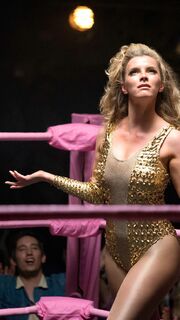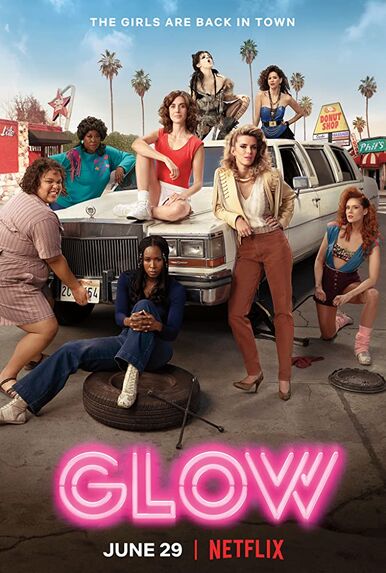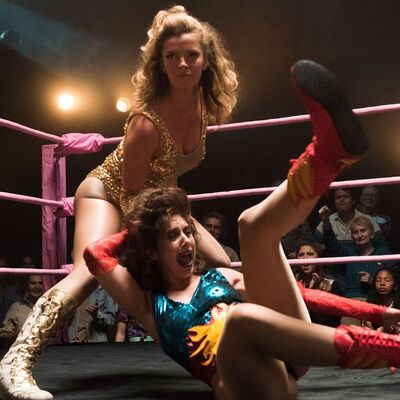GLOW is the comedy-drama show presenting multidimensional women characters, not just one-dimensional secretary “Barbies” that we used to see, as Betty Gilpin said. The show revolves around fourteen women in a fledgling professional wrestling promotion called the Gorgeous Ladies of Wrestling (GLOW). It’s based on a true story, G.L.O.W., which ran on television from 1986 to 1990.

I was drawn to the show not only because of watching women fighting against patriarchy but also of the unconventional central love story. The plot revolves around two female best friends and their complicated relationship. Ruth Wilder (played out by Alison Brie) betrays her best friend, Debbie Eagan (presented by Betty Gilpin), by sleeping with her husband.
There is no romantic, cheesy, heterosexual relationship on focus nor women aspiring to find husbands with their short and tight dresses. And, they are not idiotic Barbies laughing at men’s jokes to keep their jobs. Instead, they grow a rage machine within themselves, which they can quickly unveil.
GLOW presents women finding themselves in the ring to explore their strength. And their most effective weapon has been controlled by the male gaze for centuries — that is their bodies.
The spark of the show booms when Debbie finds she has to match with Ruth in the ring for the show’s sake. These two women, formerly best friends and currently unable to look into each other’s eyes, confront by throwing one another with body slams. And, of course, Debbie’s challenge is to tame her anger not to kill Ruth.
Below are three themes of the show, which I find so sentimental and beautiful. These also indicate how we can represent women on media without confining them into stereotypical boxes.
Her Body Is Her Own[]
Debbie (beautifully portrayed by Betty Gilpin, twice nominated for Emmy) begins the story as a former soap opera actress who had to give up her career for her baby. She is a stay-at-home parent taking care of the household while her husband is taking up the public sphere, working and earning money.

As happy and satisfied as she pretends to be, she grows the unavoidable rage against the societal standards. It is heartbreaking to watch her longing gaze when she watches a soap opera while nursing her baby.
After discovering her husband cheating with her best friend, Debbie’s anger towards the Victorian ‘angel in the house’ is triggered, and wrestling becomes her personal battlefield to fight the docile woman of her society.
She, trying to regain her self-worth and self-respect, uses her body embodying its whole functions. Her body is not only to breed but also to do the suplex, not to cover but to expose, not to be scared of its ‘decaying’ but to be empowered of its amazing transformation.
She gives all she has to wrestle after leaving her baby to the daycare. She works out passionately, trains with professional wrestlers, and gains the strength that she did not even imagine having. The ring becomes a metaphorical war zone for her to conquer Ruth over and over again while claiming her independence — in sunset flips.
“I’m back in my body. It doesn’t belong to Randy or Mark (her son and husband). I’m using it for me and I feel like a goddamn superhero,” she tells Ruth towards the end of the season. She also challenges sexist male producers and sits between them. Her tiresome journey to deal with dominant White supremacy in the industry brings her the self-owned seat of a producer. As she puts it perfectly,
“I know what I’m worth and not apologizing to anyone.”
Diversity Is Our Silent Weapon[]
There is often something false about the mainstream narratives of women. The persons we watch on the screens come as the stereotypical representation through which we generalize other individuals: conventional, silent, one-dimensional, skinny, blonde, white women to which merely short secretary lines are given.
GLOW, created by the producers of Orange Is The New Black, can portray all women from diverse cultures and sizes. Fourteen female wrestlers of the show bring unique stories of their own.

Wrestlers take on racial or nationalistic stereotypes to sell their stories in the ring. But in the background, we watch a British woman struggling to live in the U.S. without a green card, a lesbian stripper trying to make a living, an African American earning money to send her son to the Stanford, an Indian American considered a ‘terrorist’ due to her skin color, a woman masking her life with a wolf costume, a mother leaving her baby aside to become financially stable, and so forth.
Although playing the stereotypes seems uncomfortable and confusing to the women initially, this takes the source from real-life GLOW, and they are, as Sam puts it, “wrestling with stereotypes.”
In short, GLOW is like our life with different dreams, burdens, pain, and joy. Whatever the wrestlers’ background and struggles suggest to the audience, each woman has a story and needs to narrate it with their voice. We are invited to authentic portrayals of women from different ethnicities and sizes. No patriarchal or racist opinion is allowed.
Female Friendship is at the Core[]
As mentioned above, GLOW puts female friendship at the forefront. Despite the betrayal putting almost-impossible-to-be-broken ice between their friendship, Ruth and Debbie try to work it out, either consciously or unconsciously, even when they are mean to each other.
Debbie and Ruth cannot revive what they had in the first place, they cannot look into each other’s eyes, but they care about one another when nobody watches them. As if they are still each other’s best friends and stand by them in the backstage because their friendship is not intertwined with thin leaves defenseless against the soft breeze. It is indeed enduring against many hardships.
We watch Debbie and Ruth’s glimpses towards one another when one of them is happy or proud of the show she is doing. They watch over themselves in every wrestling match. Whenever they leap onto each other in the ring, they hold onto one another with support and trust.

Every scene between these two women gives us excitement like the cliched pursuits in romantic comedies.Yet, with one difference: Debbie and Ruth’s pursuits are not for romantic or sexual means, but for the innocent and affectionate desire to support each other.
They try to find consolidation in their arms. They are filled with an irresistible desire to hug each other and talk about their lives.
And, isn’t it what we all yearn in our lives? Someone so different from our personalities, but understand our inner crisis better than anyone else? Somebody whose heart aches with the idea that we are in pain, and somebody who wants to stand by ourselves yet cannot step in for justifiable reasons.
By putting this tangled friendship at the central love story of the show, GLOW switches the camera from the male gaze to the more meaningful, genuine, and empowering perspective — that is, the human gaze. The show brings a realistic view of female friendship.
GLOW came into my life when I needed it most — feeling powerless, docile, desperate, and anxious for meeting societal expectations. I was studying for my exams to graduate and working out in the mornings and running in the evenings to have the ‘ideal’ body. Sorry, the body that is idealized by the representative male gaze.
It was so tiresome — total burnout. I was spending all my energy every day, but not focusing on myself.
Then, it was not spending but wasting. And, this is not living but surviving.
GLOW saved me from my never-ending run by introducing me goddamn super-heroines.
In a nutshell, GLOW becomes successful enough to present all varieties of women and their struggles in a sexist society.
It goes against societal norms demanding women to be small and dainty. Instead, GLOW turns on the norms by attributing strong physicality to women and with their muscle gains. It also makes us feel how desperately we need to see female “born leaders” on the screens:
“We still think of a powerful man as a born leader and a powerful woman as an anomaly.” — Margaret Atwood
This article is originally published in Fearless She Wrote by Buse Umur .
